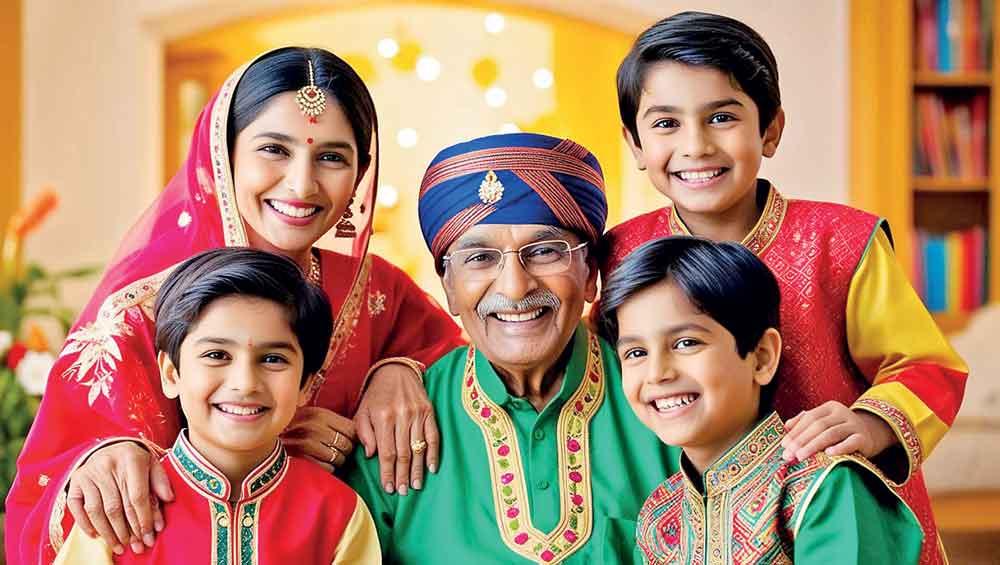Why Grandchildren Must Understand Dementia in Grandparents
In an increasingly chaotic, acronym-driven society, ruled by YOLOs (“you only live once”) and FOMOs (“fear of missing out”), where parents pronounce “delulu” (“delusional”) as “dilalla” and assume it to be a reference to a girl named Delilah, the divide between generations has become increasingly evident. Where parents find it difficult to connect with their children, it is little surprise that grandparents often feel far removed from the world of their grandchildren. And teen culture, Gen Z lingo, and shifting family dynamics are all equally responsible for this disconnect. Yet, within this gap lies a profound opportunity for mutual learning, empathy, and emotional growth. Bridging this divide, however, presents challenges, particularly when age-related conditions like dementia come into play.
Demystifying Dementia for the Next Generation
 Dementia encompasses a range of conditions affecting memory, reasoning, and behaviour, with Alzheimer’s disease being the most prevalent, accounting for about 70% of cases. Primarily impacting individuals over 60 years of age, dementia currently affects over 55 million people globally, with 10 million new cases detected each year. Alarmingly, 75% of people with dementia remain undiagnosed, a statistic that is even higher in low- and middle-income countries. As life expectancy increases, understanding dementia becomes ever more crucial. In Sri Lanka, where 12.3% of the population is aged 60 or older (the highest proportion in South Asia!), the need for awareness is pressing. In the Western Province alone, nearly a third of the population is elderly, highlighting the importance of preparing younger generations to support and comprehend the experiences of those living with dementia.
Dementia encompasses a range of conditions affecting memory, reasoning, and behaviour, with Alzheimer’s disease being the most prevalent, accounting for about 70% of cases. Primarily impacting individuals over 60 years of age, dementia currently affects over 55 million people globally, with 10 million new cases detected each year. Alarmingly, 75% of people with dementia remain undiagnosed, a statistic that is even higher in low- and middle-income countries. As life expectancy increases, understanding dementia becomes ever more crucial. In Sri Lanka, where 12.3% of the population is aged 60 or older (the highest proportion in South Asia!), the need for awareness is pressing. In the Western Province alone, nearly a third of the population is elderly, highlighting the importance of preparing younger generations to support and comprehend the experiences of those living with dementia.
For children who have had little to no exposure to dementia, which affects memory as well as emotional responses and social behaviour, witnessing the cognitive decline of a grandparent can be not just confusing and distressing, but also sadly irritating. With attention spans shrinking by the day in negative correlation to watching TikTok reels, grandchildren may have very little patience with senior family members who cannot recall previous conversations. Without understanding, children are quite likely to write off their grandparents as being “too old”. Moreover, they may misinterpret certain behavioural changes as indifference or rejection, causing children in turn to reject their grandparents.
However, when children are taught about dementia early, they are more likely to respond with patience and understanding rather than frustration when they are at the receiving end of inexplicable behaviour on the part of a grandparent.
For children who have had little to no exposure to dementia, which affects memory as well as emotional responses and social behaviour, witnessing the cognitive decline of a grandparent can be not just confusing and distressing, but also sadly irritating
The Role of Grandparents in Shaping Young Lives
Like griots of old, grandparents have long been a central part of children’s lives, offering emotional support, passing down family history, and providing wisdom. They often take on a secondary caregiver role, particularly in today’s world, where full-time working parents and single-parent households are common. Grandparents help ease the burden on parents taking on the roles of cook, chauffeur, playmate, nurturer, mentor, and present giver and, in general, spoiling the children (claiming the latter as their right!). This involvement gives children a strong, extended support system that promotes emotional development. Research shows that children with active grandparent involvement tend to have higher emotional intelligence, greater resilience, and a deeper sense of belonging.
While grandparents enrich their grandchildren’s lives, mutual understanding between the generations is essential. Children need to appreciate the ageing process and the vulnerabilities it brings, while grandparents must remain open to the changing values and norms of younger generations. This reciprocal understanding helps build relationships based on respect and empathy, rather than frustration or alienation.
Cultivating Compassion: Teaching Children to Care
As grandparents age and dementia progresses, roles naturally reverse with the caregivers becoming the cared-for. Teaching children to recognise and embrace this shift with compassion prepares them to respond with kindness, patience, and active involvement. Understanding that memory loss or confusion is part of a disease allows children to engage in more meaningful and loving interactions. Parents and educators play pivotal roles in instilling these values. Open discussions about ageing and dementia, shared readings on the topic, and involving children in caregiving tasks can normalise these experiences. Simple activities like playing board games, listening to familiar music, or taking short walks together can strengthen the bond between grandparents and grandchildren without overwhelming the elder’s memory. Schools can further support these efforts by organising Grandparent Days and encouraging intergenerational interactions.
Educating children about dementia and preparing them for potential family challenges not only nurtures empathy but also contributes to a more tolerant and accepting society.
While much emphasis is placed on how grandchildren can support their elderly grandparents, it is equally important to recognise the reciprocal nature of this relationship. Even as dementia alters a grandparent’s cognitive abilities, it offers children invaluable life lessons -responsibility, empathy, and respect for elders. These lessons shape a child’s worldview and influence future relationships, ensuring that the values of care and respect are passed on to subsequent generations.
Dementia encompasses a range of conditions affecting memory, reasoning, and behaviour, with Alzheimer's disease being the most prevalent, accounting for about 70% of cases
Embracing the Intergenerational Bond: A Collective Responsibility!
The intergenerational gap is not something to fear; it is something to bridge. Inasmuch as it is important for the older generation to understand children in their world, it is equally important that children learn to be patient with their ageing grandparents when they can no longer be as active as they once were, or have to be reminded twice or thrice. After all, dementia may change how a grandparent interacts with family, but it does not erase the love, the memories, and the deep bonds forged over the years of hugs and trips to McDonald’s. By educating the younger generation about empathy and compassion, we not only help them care for their grandparents but also guide them to become thoughtful and compassionate individuals. In a world that often prioritises speed and youth, the steady, enduring affection between a child and their grandparent stands as a powerful testament to the importance of family connection and support. Bridging the intergenerational gap paves the way for a future where empathy and respect for elders are not just ideals but daily practices. By teaching children to care for and understand their ageing relatives, we foster a more compassionate world for everyone.












